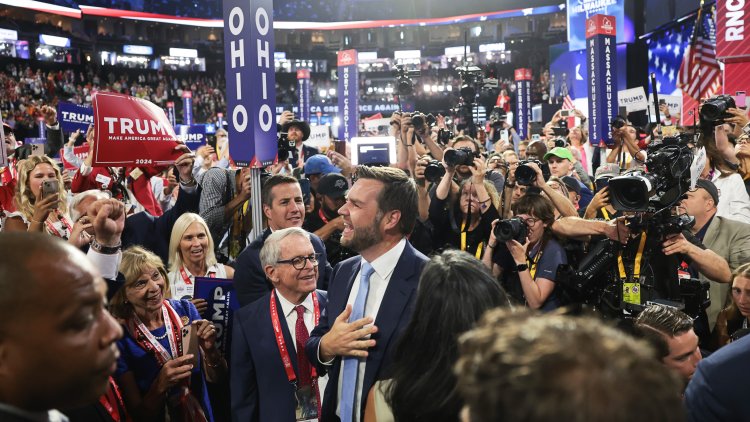Trump’s VP Announcement Didn’t Go According to Plan
The moment inside the convention hall when we learned—abruptly—that Donald Trump had chosen J.D. Vance

So much for the big reveal. When Republican delegates from across the country walked into the Fiserv Forum on Monday morning, all the buzz was about the pending selection of Donald Trump’s running mate—an announcement they believed would come that night, in prime time, a climactic conclusion to the first day of the GOP convention.
In fact, many Republicans I spoke with here—party loyalists who have come to expect pageantry from Trump—had anticipated an Apprentice-style grand finale to the so-called veepstakes. Perhaps Trump would bring several of the contenders onstage at once before naming his choice. At the very least, he’d keep everyone in suspense until the last possible moment.
Trump had very different plans. Around 2 o’clock in the afternoon, the former president posted on his social-media site that J. D. Vance, the best-selling author turned U.S. senator from Ohio, would be his running mate. Some of the delegates gathered here inside Fiserv Forum received push alerts on their phones, while others overheard neighbors reacting to the breaking news.
But many of the delegates still had no idea about the Vance pick—until they heard it suddenly and unceremoniously from Senator Mike Lee of Utah. Lee, approximately eight minutes after Trump’s post, announced it from the back of the convention hall during the opening roll call. “Utah … today proudly casts all of its 40 delegate votes for President Donald J. Trump,” Lee declared, before adding. “And his newly announced running mate, my friend and colleague J. D. Vance!”
[J. D. Vance: Opioid of the masses]
I hadn’t seen Trump’s announcement online. And, based on the stunned expressions of people standing around me, I wasn’t alone.
“Wait. What the heck just happened?” said Henry Barbour, a Mississippi delegate and member of the Republican National Committee.
Just moments earlier, Barbour and I had been leaning against the railing at the rear of the convention floor and comparing notes on the vice-presidential speculation. Two of Trump’s shortlist prospects— Senator Marco Rubio of Florida and North Dakota Governor Doug Burgum—had already been informed that they were out of the running. That much was known. Meanwhile, the name of Virginia Governor Glenn Youngkin seemed, in those early-afternoon hours, to be gaining steam.
Barbour was skeptical: He’d just met with Youngkin on Monday morning, and the governor seemed casual and relaxed. “If that guy’s really about to be picked as our vice-presidential nominee,” Barbour told me, “he is one cool customer.”
As Barbour and I stood chatting, I spotted Lee standing up at a microphone. Soon it would be Utah’s turn to announce its allocation of delegates, and Lee, who had prepared a short speech for the occasion, would be speaking on behalf of the delegation. As the senator waited his turn, however, a delegate from Maryland saddled up beside him: David Bossie.
Bossie is no ordinary delegate; he served as Trump’s deputy campaign manager in 2016 and remains one of the former president’s closest confidants. So wired into Trump’s political operation is Bossie that he came on the floor in Milwaukee wearing an earpiece—allowing for direct communication with the campaign’s high command. He’d been prowling the arena’s red carpeting for an hour already. Now, as he finally came to a stop next to Lee, Bossie was receiving word through the earpiece: Vance was the choice.
[David A. Graham: The next Republican leader]
Turning and seeing Lee, Bossie shared the news. Lee was ecstatic. “Is that public?” he asked.
Bossie pulled out his phone. Trump had, just moments prior, posted the news to Truth Social. “Now it is,” he told Lee, showing him the screen. “You can be the first to announce it here.”
Lee did just that, delivering an early and unexpected jolt to the convention proceedings. Judging by the ensuing ovation, delegates were thrilled with the selection of Vance. Still, surveying the surroundings at that moment—no booming introduction music or flashy choreographed entrance, just an abrupt announcement to a half-empty arena—some Republicans confessed to feeling underwhelmed.
“The whole thing just seemed strange,” José Fuentes, a delegate from Puerto Rico, told me shortly after Lee’s announcement. “I just wonder—is that really how Trump wanted it?”
What's Your Reaction?




















